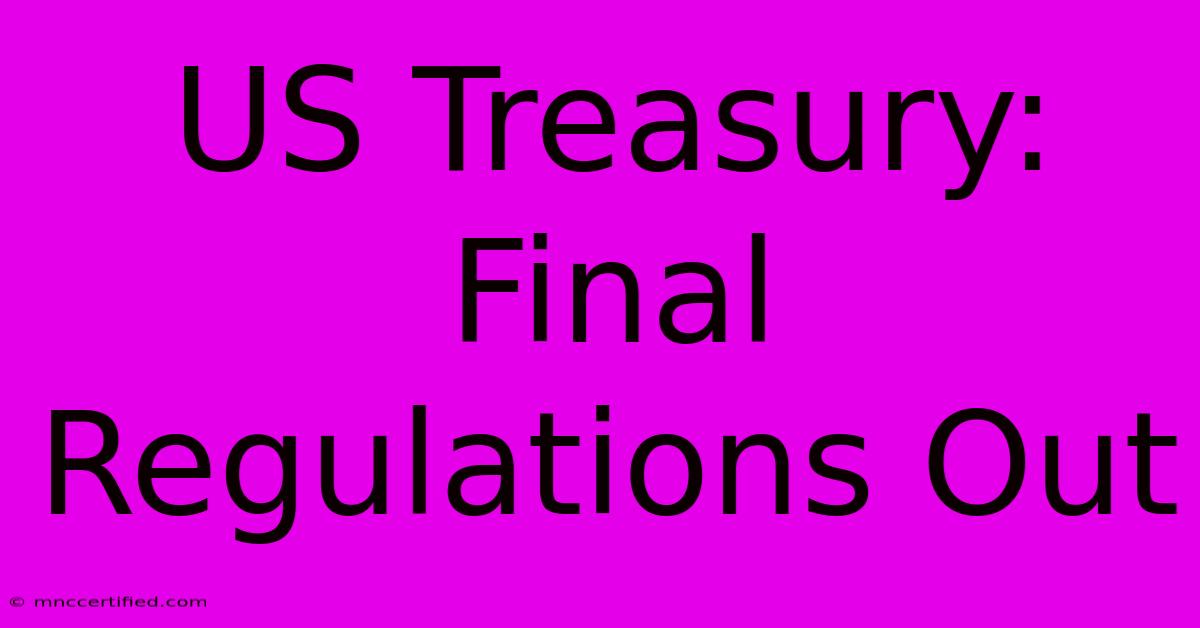US Treasury: Final Regulations Out

Table of Contents
US Treasury: Final Regulations Out – What You Need to Know
The US Treasury Department has released its final regulations on [insert specific regulation topic here, e.g., the Inflation Reduction Act's clean energy tax credits]. This highly anticipated announcement impacts various sectors and individuals, creating both opportunities and challenges. This article breaks down the key aspects of these final regulations, offering clarity on what they mean for you.
Understanding the New Regulations: A Summary
The final regulations, released on [date of release], significantly clarify and, in some cases, alter the initial proposed rules. Key changes include [list 3-5 bullet points summarizing the most impactful changes. Be specific and avoid jargon where possible. For example: Increased eligibility requirements for certain tax credits. Clarification on the definition of "domestically manufactured" components. New reporting requirements for businesses claiming tax benefits].
These adjustments aim to [explain the stated goal of the regulations, e.g., "streamline the application process for clean energy tax credits," or "prevent fraud and ensure compliance with existing laws"]. However, the impact on businesses and individuals will vary depending on their specific circumstances.
Key Areas of Impact:
- [Area 1, e.g., Renewable Energy Sector]: The regulations significantly impact [explain specific impact on this area, e.g., "the viability of small-scale solar projects" or "the competitiveness of US-manufactured wind turbines"]. [Include a specific example, e.g., "The new requirements for domestic content may increase costs for smaller developers."].
- [Area 2, e.g., Manufacturing Industry]: Businesses involved in [explain area, e.g., "manufacturing of solar panels" or "production of electric vehicle batteries"] will need to [explain required action, e.g., "adapt their supply chains to meet the new domestic content requirements" or "invest in new technologies to comply with stricter emission standards"]. [Include a specific example, e.g., "Companies may face penalties for failing to meet the newly defined thresholds for domestic content."].
- [Area 3, e.g., Taxpayers]: Individual taxpayers claiming [explain tax credit, e.g., "clean energy tax credits"] will need to [explain required action, e.g., "meticulously document their expenses" or "consult with a tax professional to ensure compliance"]. [Include a specific example, e.g., "Failure to meet the documentation requirements could result in the denial of the tax credit."].
Navigating the Complexity: Next Steps for Businesses and Individuals
The complexity of these regulations necessitates careful review and planning. Here’s what you should do:
- Consult with Professionals: Engage legal and tax professionals experienced in navigating these complex regulations. They can provide tailored advice based on your specific situation.
- Thorough Review: Carefully examine the full text of the final regulations to understand their implications for your business or individual tax situation.
- Update Internal Processes: Businesses should update their internal processes and systems to ensure compliance with the new rules.
- Plan Ahead: Proactive planning is crucial to avoid potential penalties and maximize the benefits of these regulations.
Looking Ahead: Implications and Opportunities
These final regulations mark a significant step in [explain the larger context, e.g., "the transition to a clean energy economy" or "the modernization of tax code"]. While they present challenges, they also offer opportunities for innovation and growth in [mention specific sectors, e.g., "renewable energy technologies," "advanced manufacturing," or "sustainable infrastructure"]. The long-term impact remains to be seen, but businesses and individuals who proactively adapt to these changes will be best positioned for success.
Keywords:
US Treasury, Final Regulations, [Specific Regulation Topic, e.g., Inflation Reduction Act, Clean Energy Tax Credits], Tax Credits, Clean Energy, Renewable Energy, Domestic Content, Manufacturing, Tax Compliance, Legal Compliance, Tax Professionals, [Other relevant keywords based on the specific regulation].
Note: This is a template. You need to fill in the bracketed information with specifics related to the actual final regulations released by the US Treasury. Remember to cite the official source of the regulations. Conduct thorough research to ensure accuracy and avoid misinformation. The keyword suggestions should also be tailored to the specific regulation. Finally, remember to promote this content through social media and other channels (off-page SEO).

Thank you for visiting our website wich cover about US Treasury: Final Regulations Out. We hope the information provided has been useful to you. Feel free to contact us if you have any questions or need further assistance. See you next time and dont miss to bookmark.
Featured Posts
-
Arsenal Vs Ipswich Game Result And Post Match
Dec 28, 2024
-
Chat Gpt Service Disruption User Reports
Dec 28, 2024
-
Holiday Market Fire Nyc
Dec 28, 2024
-
Arsenal Second 1 0 Premier League Win
Dec 28, 2024
-
Soho Christmas Car Crash Man Charged
Dec 28, 2024